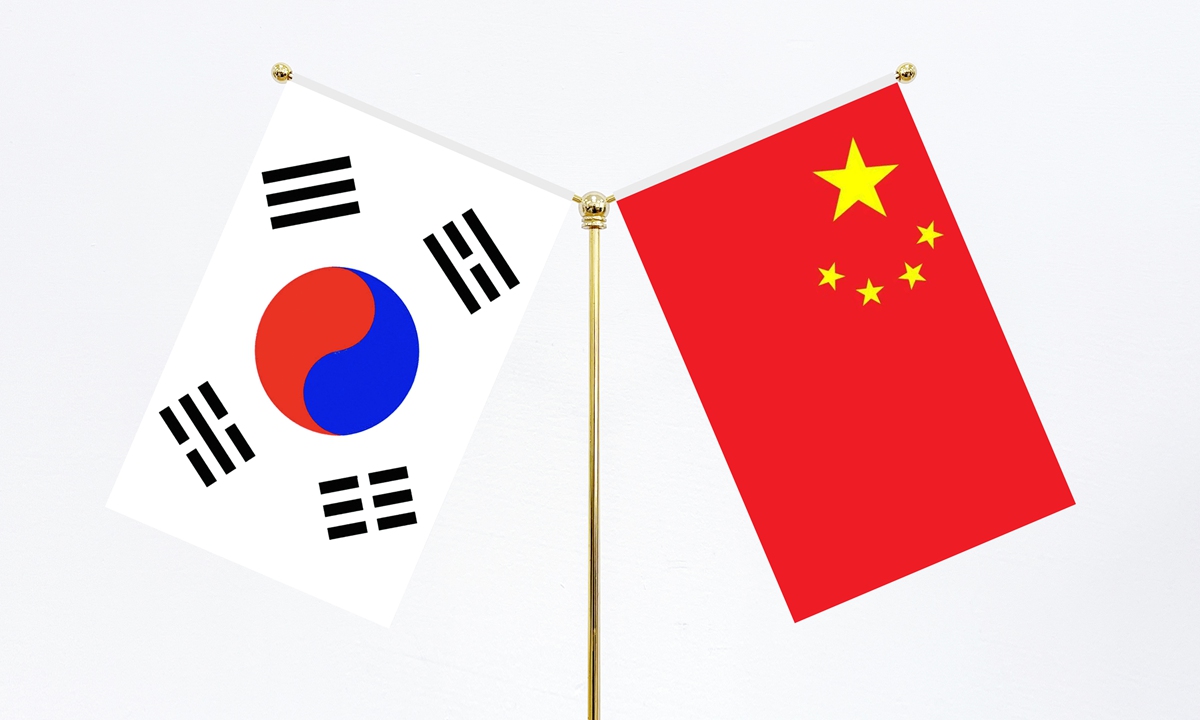Chinese Foreign Minister Wang Yi on Monday met South Korean Foreign Minister Cho Tae-yul, who began a two-day visit to China that marks the first trip to Beijing by a South Korean foreign minister in more than six years.
Eyeing the China-Japan-South Korea trilateral leaders’ meeting as its primary task, the trip also aims to make an improvement-oriented adjustment in South Korea’s foreign policy, with its relations with China needing to be eased and reconciled, and steady and improved neighborly relations are conducive to regional security and stability, experts said.
Chinese Foreign Minister Wang, also a member of the Political Bureau of the Communist Party of China Central Committee, met Cho in Beijing on Monday.
In the meeting, Wang said that healthy and stable development of China-South Korea relations is in line with the trend of the times and in the fundamental interests of the two peoples. The recent ups and downs and challenges faced by bilateral relations have increased significantly. This is not in line with the common interests of the two countries, and it is something we do not want to see.
China is willing to strengthen communication and exchanges with South Korea, adhere to the original intention of establishing diplomatic relations, maintain good neighborly relations, take care of each other’s major concerns, eliminate external interference, and work together to promote the continuous and healthy development of China-South Korea relations, Wang said.
Both China and South Korea need a stable and friendly bilateral relationship, which is a shared desire, some experts said. However, how this desire can be realized requires the two countries to pursue a consensus and foundation whereby both sides can formulate policies toward each other based entirely on their national interests. This foundation is the direction we should aim for, and with it, China-South Korea relations can develop in a stable and healthy manner, some experts said.
Before heading to Beijing, Cho said on Monday at Gimpo International Airport that he will have “frank and in-depth” talks with his Chinese counterpart Wang, and expects the meeting to help create fresh momentum for the development of bilateral relations, the Yonhap News Agency reported.
“I will take an important first step in creating new momentum in the development of South Korea-China relations,” Cho was quoted as saying in the media report.
South Korea will make its position clear on issues of principle but focus on areas where we share great potential for cooperation to lay a solid foundation for the development of bilateral ties, the South Korean senior diplomat said.
Cho’s visit will be the first meeting between the Chinese and South Korean foreign ministers since the trilateral foreign ministers’ meeting between China, Japan and South Korea in the South Korean city of Bushan in November 2023.
It is the first official visit by a South Korean foreign minister to Beijing in six and a half years since Kang Kyung-wha came to Beijing in 2017.
In August 2022, due to the impact of the COVID-19 pandemic, then South Korean Foreign Minister Park Jin held talks with Wang Yi in Qingdao, East China’s Shandong Province.
South Korea has been looking to improve ties with China, its largest trading partner and a key player in nuclear diplomacy with North Korea, the Korea Times said. Since Cho took office as foreign minister early in January, he stressed the importance of keeping a “stable” relationship with Beijing, citing the potential for deeper cooperation in the economy, North Korean issues and other areas, according to the South Korean media outlet.
Major focuses
“As the host of the three-way meeting this year, South Korea aims to further promote the successful convening of the China-Japan-South Korea trilateral leaders’ meeting, which is an important task of Cho’s visit to China,” Yang Xiyu, a senior research fellow at the China Institute of International Studies, told the Global Times on Monday.
Another major task is to stabilize bilateral relations, which have noticeably declined over the past few years. There has been a stronger desire to make an improvement-oriented adjustment in South Korea’s foreign relations, especially since Yoon Suk-yeol’s administration appointed a new foreign minister, Yang said.
While Seoul’s pro-US approach will continue as the basic policy, its relations with Beijing need to be eased and reconciled, Yang noted, adding that this is not an overnight task but rather a goal that requires significant efforts to accomplish.
Against the backdrop of major fluctuations in China-South Korea relations in recent years, particularly after South Korean President Yoon Suk-yeol suffered a big defeat in legislative elections, recently, the South Korean public is generally dissatisfied with the Yoon administration, and one aspect of this comes from its overly pro-US foreign policy, experts said.
“To some extent, Cho’s visit to China is also an attempt at diplomatic correction, aiming to find as much of a balance as possible,” Xiang Haoyu, a research fellow at the China Institute of International Studies, told the Global Times on Monday.
Since taking office in May 2022, the Yoon administration has brazenly intervened in the Taiwan question. Yoon himself mentioned it several times, including during visits to the US and Europe, and during a trilateral meeting with the US and Japan.
In particular, the US-Japan-South Korea summit at Camp David last August, which aims to form a “mini NATO” structure, has been widely criticized as being destructive to regional security, making the situation more complex through more conflict.
The Camp David Summit was a key event in the institutionalization of trilateral cooperation. Although the three parties ostensibly focused on North Korea’s nuclear and missile issues, advancing military intelligence sharing and joint exercises, the signs of targeting China became increasingly apparent, Wang Junsheng, a research fellow of East Asian studies at the Chinese Academy of Social Sciences in Beijing, told the Global Times on Monday.
While it is unlikely that the Yoon administration will fundamentally change its China policy after the parliamentary elections, this visit does present an opportunity to push for improved relations with China, Wang noted.
“However, whether improvement can be achieved depends on how sincere the Yoon administration can be. If it continues to follow the US in pressuring China while simultaneously hoping to improve relations through mere gestures, it will be difficult,” he said.











